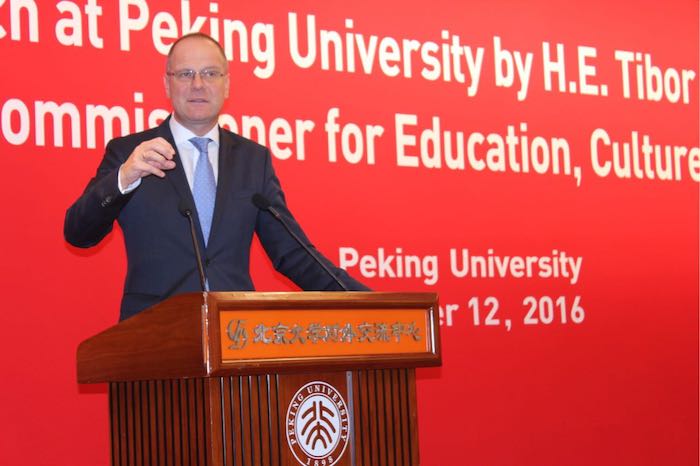On the morning of October 12, 2016, the European Commissioner for Education, Culture, Youth and Sport, Tibor Navracsics, visited Peking University to promote educational cooperation between the EU and China. The event was held at the Moonlight Hall of the Yingjie Exchange Center. The European Union Ambassador to China Hans Dietmar Schweisgut; First Secretary to the Delegation of the European Union to China Marcin Grabiec; Deputy Head of Cabinet Alicja Magda Herbowska; and Cabinet Expert Patricia Reilly were also in attendance.

After a brief introduction by the Director of the Centre for European Studies, Li Qiang, Navracsics, who previously served as Minister of Foreign Affairs and Trade and Minister of Administration and Justice of Hungary, addressed the students of PKU on the future of academic exchanges between China and the European Union. His speech held a positive outlook towards the future of such collaborations on an expanding framework. In particular, Navracsics focused on the Erasmus Program (European Region Action Scheme for the Mobility of University Students) and Erasmus Program Plus. He repeatedly stressed the increased partnership between the EU and China by pointing out that Chinese students were now the largest non-European student body in Europe. Similarly, China is now one of the most popular destinations for European students to study abroad. He strongly recommended all Peking University students to inquire about opportunities within their respective departments about studying in the EU.
Navracsics also pointed out that research collaboration between China and the EU is increasing as well. He further pointed out that the Marie Sklodowska – Curie Research Fellowship allowed many Chinese scholars to access funding to pursue research work in popular destinations such as the United Kingdom, France, Germany, and Italy. On the other hand, more than a hundred European scholars, mostly from Italy, came to China to do research. Furthermore, he noted the increasing tendency for the EU and China to borrow from each other their best educational practices and their joint efforts to integrate education systems in order to allow young scholars from both China and the EU to make better educational decisions and facilitate recognition of their studies. Notably, he stressed the importance of working together to tackle global issues. He noted that even internally we need to learn to appreciate our differences. He ended his speech by emphasizing that the duty of politicians is to ensure that “our education systems can tackle such challenges.”

During the Q&A section, PKU students asked Navracsics if the European Union was becoming less welcoming to foreigners in light of the recent migrant crisis and terrorist attacks, as well as asking the attractive points about studying in Europe. Navracsics explained that nationalist voices within the EU often came on top in cycles. However, he expressed the urgency of the current situation by expressing that the EU was at a ‘cross-roads.’ As for the merits of studying in Europe, Navracsics said that studying in Europe was much more inspiring than studying in the United States or Japan, especially in terms of learning about the most advanced technologies, and being immersed in the most intellectual atmosphere.
Written by: Deniz Ozensoy
Edited by: Dohun Na



